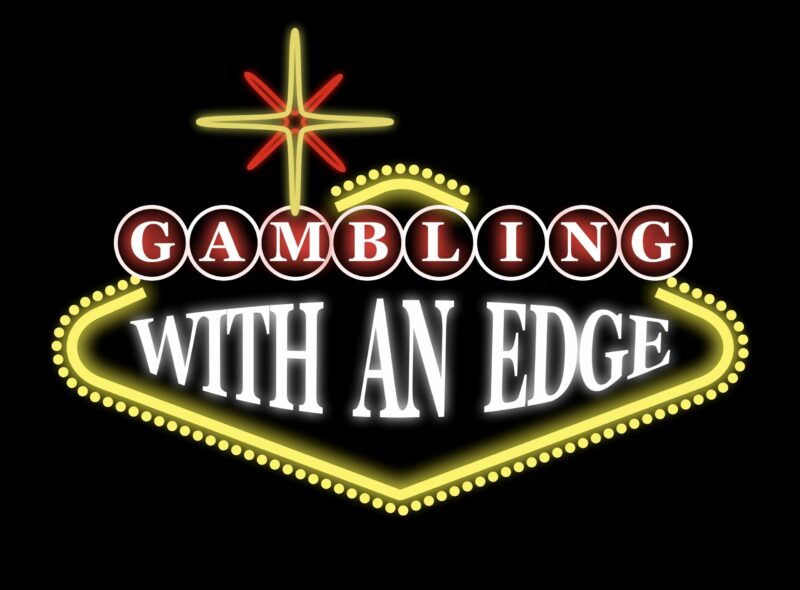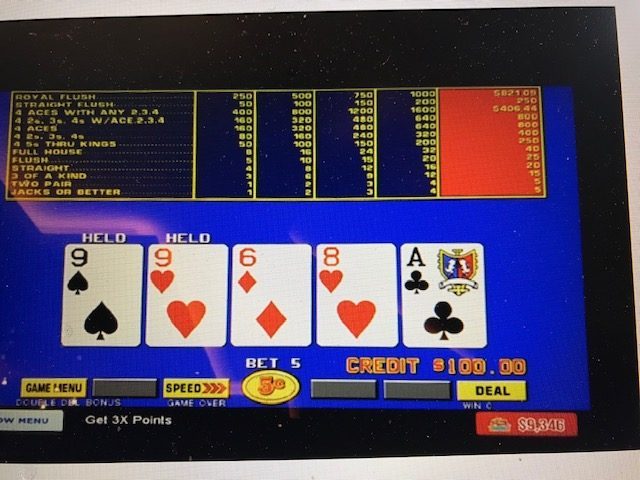Today’s column is less technical and more about “how I do things” that aren’t specifically related to video poker.
Most of you have heard of Adele, one of the premier singers of our time. She is performing a series of concerts at Caesars Palace in Las Vegas, and I was invited to receive two tickets. Bonnie’s daughter, Joyce, is a huge fan, so we arranged for Bonnie and Joyce to attend the concert on December 3, while I played enough in the casino to “keep those offers coming.”
The concert began at 8 p.m. and we arranged to eat at the Bacchanal Buffet beforehand. This buffet costs $80 apiece — and is worth it (and don’t even think about getting in without a reservation on a busy weekend night). Bonnie and I each had $100 celebration dinners that expire January 31, we each get daily $10 food vouchers when we visit any Las Vegas Caesars property (along with four drink vouchers worth up to a $25 drink apiece.) These are called “Laurel Awards” and are basically a replacement for Diamond Lounges, which are not open. Although sometimes I will have a glass of wine with dinner, on this day I still had a lot of play to do. At the end of our evening, we’ll get Fiji water for as many of our drink coupons as we have left. It’s a “waste” to use the vouchers for this, but better than letting them expire unused. (Math majors may notice that two $100 vouchers and two $10 vouchers don’t add up to the $240 the buffet costs. I had plenty of Reward Credits (RCs) to pay for the rest.)
It takes a lot of play to keep the offers coming, especially since I’m playing slots there, not video poker. They do have 9/6 Jacks or Better (earning one RC per $25 coin-in) for $5, $10, and $25 denominations, which definitely isn’t terrible, but when you can find slots in a positive situation (where previous, unknowledgeable, players have left them in such a state), this earns one RC per $5 coin-in and can be better than the 99.54% of this Jacks or Better game. There are some Ultimate X and Ultimate X Bonus Streak games, but those are short plays only and you can’t dependably find enough good ones.
The downside of playing slots is you never know what you’re going to find today and there are other “slot hustlers” who know approximately what you do. And some of the plays are for 60¢, 75¢, or 80¢, so even when it’s a good deal percentagewise, it can take a long time to earn sufficient points. Sometimes, of course, I can find a positive game at $20 or more per play, and at that rate I can earn a sizeable number of RCs per hour. But mostly it’s a mixture of games requiring $4.00 and less.
Playing such games involves a lot of moving around. While sometimes you can find a play that lasts a considerable period of time, often plays are done in five minutes or less. Sometimes much less. So then you have to move along to the next machine to see if it is playable. And then an hour or more later, return to the same machine to see if somebody else has played it enough to make it profitable. On a weekend night, it doesn’t take long for the games to “recycle.”
Back to Bonnie: She is close to 80 years old and uses a walker some of the time. She doesn’t need it for short walks, but there’s enough walking in a large casino that it’s a good idea for her to bring it. Plus, at Caesars we park at Seven Stars valet, so she stops by Seven Stars check-in, shows her card, and asks for four, six, or eight bottles of water. Her walker has a storage area under the seat, so this water is easy to transport. We both drink a lot of water in casinos, and on this night, Joyce was along too.
Bonnie asked me to keep her walker while she went into the concert because there wouldn’t be room at her seat for it. While I’m sure the venue has the capability to store the walker during the performance, we thought it would be easier if I kept it. So I did, as I went from machine to machine checking for opportunities. Caesars is a fairly large property and I made five or so laps around it while the concert was happening.
I had never used Bonnie’s walker before — and it changed my world! I regularly go to the gym, run several miles a week, and can walk pretty fast through a casino, but when I used her walker, I gave off a different vibe totally.
Bonnie is shorter than me, so I had to bend over a bit to use the walker. (The handle-height is adjustable, but it’s finicky to do and fits better in the car when it’s at her height.) People see this bent-over, gray-haired old man using a walker and take it at face value. I didn’t set out to use it as a disguise or a prop, but it quickly became one. People smiled at me and moved over to let me pass. (Caesars Palace on a Saturday night can be a very crowded place — especially between rows of slots or near entrances of restaurants, clubs, or the ballroom.)
You often see people sitting at an unoccupied machine but not playing. They might be waiting for somebody else. They might be charging their cell phone. They might be resting before resuming their night. If I see the game is playable, I politely ask such a person if I can play the machine. Normally I succeed perhaps 60% of the time when I do this. With the walker, I succeeded 90% of the time. (Often, I don’t know whether the machine is playable or not when I ask if I can play. Each machine may have four denominations and five “number of coins” games per denomination. Often the games for one of the denominations are displayed on the front, so I can check those without actually sitting down, but the other denominations are hidden. Fortunately, even when I sit down, spend 30 seconds checking to see if anything is playable, and then leave, nobody has said words to the effect, “Hey! You said you wanted to play, and you didn’t play! Why did you make me stand up!”)
Plus, while I had the walker next to me, in 2½ hours, nine people came over and gave me small TITO tickets. The change machines do not cash out the “cents” part of a ticket and standing in line at the cashier for 42¢ is arguably a waste of time, so people frequently give small tickets away — or leave them on the top of their machine. They would rather a random player receive the money than the “greedy” casino. This particular “greedy” player is always happy to receive such donations and I put it into the machine immediately where it basically disappears into the total number of credits.
One lady apologized for it being only 65¢ (which was actually larger than average for the tickets I was given), never mind that I had more than $800 in credits in the machine when it happened, but I thanked her and told her I was such a good player that with some luck, I was pretty sure I could turn it into 67¢! That response made her day.
I couldn’t depend on getting enough play during the concert (Caesars uses an average daily theoretical calculated by which games you play and how much you play, and the size of your offers are based on that. If your play drops too much, so do your offers.)
So I started my day at Harrah’s, which is part of the Caesars system, and play there counts just as much as play at Caesars itself. I traveled a few laps between Harrah’s, Linq, and Flamingo for about four hours before I drove over to Caesars. Joyce brought Bonnie to Caesars in time for the Bacchanal buffet dinner. While Caesars and Harrah’s are within 15 minutes walking distance, (and almost the same driving time given walking to the car, dealing with traffic, and checking into valet parking at the second hotel), I definitely wanted the car at Caesars at the end of the evening. Bonnie and I would both be tired from the day, it would be a 25-minute walk for Bonnie, and the weather would be in the 40s. She was raised in Montana, but has lived in Vegas for 30 years and doesn’t like walking around in weather that cold.
I could have parked at Paris and played there and at Planet Hollywood (plus at Bally’s which as you read this has been renamed Horseshoe Las Vegas). At the time this happened, the Horseshoe was being remodeled and there were a lot of “Pardon our dust” signs about. They may now have a selection of slots I find more attractive than those they had previously, but with the games they used to have, I liked the mix at Harrah’s/Linq/Flamingo more than the ones at Bally’s/Paris/Planet Hollywood. You can bet, though, that in the near future I’ll check out the Horseshoe and re-evaluate the situation.
While I realize that using a walker on a regular basis would provide me with benefits, I’m not planning on doing it. I’m almost 76 years old and needing to use a walker may well be in my not-too-distant future. I’m still spry enough to not need a walker, so I’ll give up those “benefits.” I believe that most people who use walkers need to do so, have life tougher than I do at the current time, and I don’t want to make their life any tougher. The more people who use walkers who don’t actually need to do so, the more it clogs up the system.
So that’s how I did it on that particular day. Maybe there’s something here that will help you understand how the winning process is done. It’s certainly not just one secret. And if you didn’t learn something new, you can safely bet that next week’s blogpost will be entirely different.






